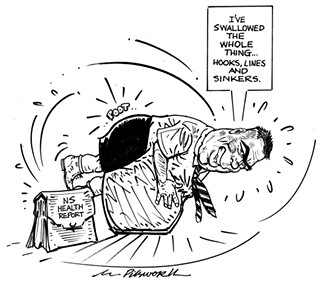"Health-care system near collapse," shrieked a headline
OK, granted, our health system isn't perfect. Many Nova Scotians can't find family doctors; rural emergency rooms are short-staffed; there are long wait times for surgical procedure
Yep, it's still true that we are spending a hell of a lot of money on the health system---nearly half the provincial budget, and rising. Ninety-four bucks every second! Sounds like a lot, and it is. In Nova Scotia, however, the health system costs us nine percent of our productive wealth, less than one dollar in 10. Even the bean-counting consultants admit that if Nova Scotia's spending per person is taken into account, we're "in the middle of the pack" when compared to most other industrialized nations. They might have added that successive rounds of federal/provincial tax cuts haven't helped either. Nationally, those cuts amount to $50 billion a year in lost revenues, not counting the latest round from the Harper Tories. Obviously, it gets harder to finance social programs if governments keep handing money back---money that mainly benefits the well-off. And here's another astonishing fact: Canadians cough up billions more every year to support their private autos than they spend on health care. In October 2003, I calculated that car owners paid just over $100 billion in ownership charges, operating expenses and fees. But when everything was tallied, including air pollution, accidents and road maintenance, the total cost of supporting the private auto added up to $200 billion a year. In 2005, by contrast, we spent a total of $142 billion on health care---$98.8 billion of which went to support the publicly funded system that our ink-stained wretches claim is hurling us into financial ruin.
In the end, though, the health care debate is not just about money, it's about choice. I'd advise my newspaper colleagues to calm down---no, don't take a Paxil; read a book! In Prescription for Excellence, Michael Rachlis, a medical doctor and health policy analyst, explains how other provinces are reducing hospital overcrowding, cutting wait times and organizing more effective community medicine. Rachlis also points out that good health is about far more than just
treating illness. It's also about the quality of people's lives. In that sense, eliminating poverty would be the best
medicine of all.















